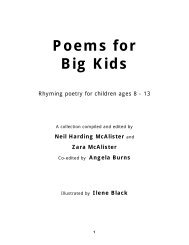New Classic Poems – Contemporary Verse That Rhymes
New Classic Poems – Contemporary Verse That Rhymes
New Classic Poems – Contemporary Verse That Rhymes
You also want an ePaper? Increase the reach of your titles
YUMPU automatically turns print PDFs into web optimized ePapers that Google loves.
<strong>New</strong> <strong>Classic</strong> <strong>Poems</strong><br />
Is Poetry Dead<br />
brilliant poet-songwriters such as Leonard<br />
Cohen and Tom Waits have almost bridged this<br />
chasm; but their performances are an integral,<br />
inseparable component of their special art. Their<br />
song-poems are generally appreciated as auditory<br />
experiences rather than as words read from<br />
printed pages.<br />
Most readers now have little or no<br />
exposure to well-written, contemporary, formal<br />
poetry. In our modern world, poems that rhyme<br />
are merely old-fashioned; something we were<br />
exposed to during school days when the works<br />
of dead poets were exhumed for dissection in<br />
English literature classes.<br />
This book was born of frustration with<br />
this state of affairs. Just as a preponderance of<br />
badly-written free verse in no way diminishes the<br />
genius of accomplished poets who have<br />
mastered that genre, a plethora of commercial,<br />
rhyming doggerel does not reflect the ingenuity,<br />
grandeur, emotional impact and intellectual<br />
integrity of well-constructed, formal poetry.<br />
Unfortunately, even the best of modern,<br />
formal poetry may not reach a potentially<br />
appreciative audience. The most casual survey of<br />
the current books and journals where poetry<br />
appears confirms that, except for a few<br />
publications with a bent towards neoformalism,<br />
there exists an almost universal prejudice against<br />
poetry that scans and rhymes. Neoformalists<br />
believe good poetry does not require its readers<br />
to possess special education or arcane sensitivity<br />
in order to appreciate it properly. <strong>Classic</strong>al poets<br />
always directed their work at a literate,<br />
thoughtful, but general audience. By contrast,<br />
obscurantism seems to have been elevated to the<br />
cardinal virtue of free verse. The more<br />
obstinately such a work refuses to divulge its<br />
meaning to the general reader, the more likely it<br />
is to find a home on the printed page.<br />
At the same time, the free verse style of<br />
poetry considered avant-garde in our<br />
grandparents’ generation has grown rather<br />
inward-looking and stale. Its audience has<br />
shrunk proportionately. The anæmic sales of<br />
poetry books in comparison to other fiction and<br />
non-fiction stands as irrefutable evidence of the<br />
book-buying public’s indifference towards<br />
contemporary poetic expression. If money talks<br />
in our modern world, the silence is deafening.<br />
Having utterly lost touch with the kind<br />
of mass readership that Longfellow enjoyed in<br />
his lifetime, present-day poets direct their output<br />
mainly towards each other, publishing on the<br />
Internet, or <strong>–</strong> when they can get their works into<br />
print at all <strong>–</strong> in thin chap books and special<br />
interest journals. Total press runs typically range<br />
from dozens to a few thousand copies for a<br />
“best seller.”<br />
Moribund it may be; but formal poetry is<br />
not quite dead in the 21 st Century.<br />
With fortuitous timing, modern<br />
technology comes to the aid of this<br />
ailing, traditional art form. Although the<br />
democratic medium of the Internet<br />
indiscriminately spreads literary drivel, it also<br />
allows serious and talented poets of all genres to<br />
address a potentially wide audience.<br />
With this in mind, <strong>Contemporary</strong> Formal<br />
Poetry decided to throw open its Internet site to a<br />
contest for rhyming, metrical poems only.<br />
Detailed guidelines for what would and would<br />
not be acceptable were posted. (Appendix A.)<br />
The very concept of a poetry competition is<br />
inherently problematic. Which poem is the<br />
“best” <strong>–</strong> The Rime of the Ancient Mariner, The<br />
Village Blacksmith, or Do Not Go Gentle Into <strong>That</strong><br />
Good Night Poet, teacher, editor and noted critic<br />
John Ciardi once warned that “there will never<br />
be a complete system for … ‘judging’ poetry.” 2<br />
Therefore three equal prizes of CDN$ 50 were<br />
initially offered for three works that would stand<br />
out as being particularly praiseworthy in some<br />
manner.<br />
<strong>Poems</strong> in all formal “western” styles<br />
were invited: sonnets, villanelles, odes, elegies<br />
and epics, narratives, ballades, acrostics and so on.<br />
Particularly welcomed were the longer works<br />
that cannot get published elsewhere <strong>–</strong> the big<br />
narratives that do not fit within the limited space<br />
available in small periodicals, or inside the<br />
cramped submission boxes on most of the postit-yourself<br />
Internet competitions.<br />
This contest immediately attracted an<br />
untapped mother lode of poetic creativity. The<br />
first entry, Peter Gilchrist’s polished narrative,<br />
The Sparrow and the Hawk, appeared in the E-mail<br />
in-box within hours of the contest’s<br />
announcement. Several hundred entries were<br />
11



